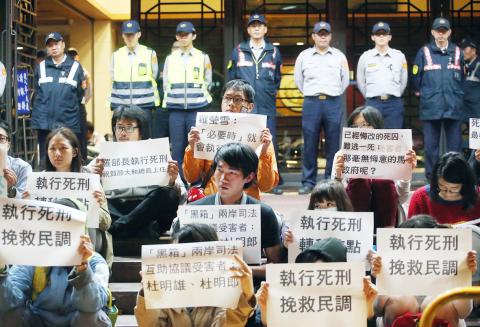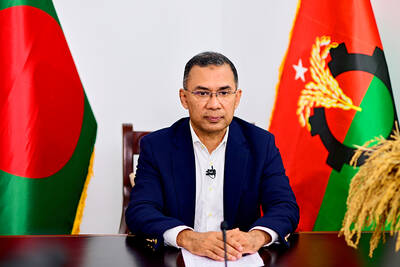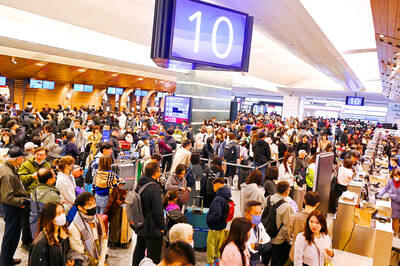Anti-death penalty activists yesterday criticized the government for the execution of five death-row inmates on Tuesday, and accused President Ma Ying-jeou (馬英九) of using the executions to divert attention from political controversies.
The activists said some of the convictions were “questionable.”
Taiwan Alliance to End the Death Penalty executive director Lin Hsin-yi (林欣怡) released a statement late on Tuesday night, criticizing the government for executing inmates whose convictions were “questionable,” and accusing the government of trying to draw public attention away from recent events such as the violent crackdown on demonstrators occupying Taipei’s major thoroughfares, the disputes over the Fourth Nuclear Power Plant and protests against the cross-strait service trade agreement.

Photo: CNA
“Among the five executed, the sentencing of brothers Tu Ming-lang (杜明郎) and Tu Ming-hsiung (杜明雄), who were accused of murder in China, remains questionable, especially considering that they were at one point declared not guilty,” Lin said
“The Taiwan Association for Innocence [TAFI] was still looking into their case before they were executed in Tainan Prison,” he added.
Another “questionable case” was that of Liu Yen-kuo (劉炎國), who was convicted of killing a police officer and a woman, Lin said.
Despite a lack of evidence to prove that that Liu had killed the woman, and the fact that the woman’s family believed that Liu had not killed her, the court remained convinced that he had killed both victims, Lin said.
“After the Tu brothers were accused of homicide in China, the court made a ruling based mostly on interrogations, testimonies and evidence provided by the Chinese police. The brothers were not allowed to ask questions in their own defense during their trial,” TAFI executive director Lo Shih-hsiang (羅士翔) said.
“Despite their once having been found not guilty, despite the questions in the ruling and despite their having continued to insist on their innocence after they were sentenced to death, they were still executed,” he said.
Lo said that based on his experience working with many inmates, he believes that many verdicts are still questionable, but the questions are not properly addressed.
“I think it is important to be especially cautious when it comes to the death sentence because it is not reversible,” Lo said.
“TAFI urges the government to suspend all executions before there is a way to make sure that none of the inmates are wrongfully executed,” he said.
Liu’s attorney, Chiu Hsien-chih (邱顯智), said that he was saddened to hear about the executions, especially since his birthday was Tuesday.
In a post on Facebook, Chiu wrote that he had met with Liu in the Taichung Detention Center on Tuesday afternoon to check with him on the details for filing a request for extraordinary appeal with the attorney general that day.
“After the meeting, we walked through the corridor together and he told me he was sorry that he could not prepare a birthday present for me. I laughed and told him not to worry and that there is always next time,” Chiu said.
“But in the evening I learned that he was executed, and there is no next time,” the lawyer said.
“I filed the request for extraordinary appeal in the afternoon, but it was turned down by the Supreme Prosecutors’ Office within an hour, and Liu was executed in the evening,” Chiu said. “I do not see a cautious procedure in the judicial system to deal with someone’s life and death.”

PEACE AT LAST? UN experts had warned of threats and attacks ahead of the voting, but after a turbulent period, Bangladesh has seemingly reacted to the result with calm The Bangladesh Nationalist Party (BNP) yesterday celebrated a landslide victory in the first elections held since a deadly 2024 uprising, with party leader Tarique Rahman to become prime minister. Bangladesh Election Commission figures showed that the BNP alliance had won 212 seats, compared with 77 for the Islamist-led Jamaat-e-Islami alliance. The US embassy congratulated Rahman and the BNP for a “historic victory,” while India praised Rahman’s “decisive win” in a significant step after recent rocky relations with Bangladesh. China and Pakistan, which grew closer to Bangladesh since the uprising and the souring of ties with India, where ousted Bangladeshi prime minister Sheikh Hasina

FAST-TRACK: The deal is to be sent to the legislature, but time is of the essence, as Trump had raised tariffs on Seoul when it failed to quickly ratify a similar pact Taiwan and the US on Thursday signed a trade agreement that caps US tariffs on Taiwanese goods at 15 percent and provides preferential market access for US industrial and agricultural exports, including cars, and beef and pork products. The Taiwan-US Agreement on Reciprocal Trade confirms a 15 percent US tariff for Taiwanese goods, and grants Taiwanese semiconductors and related products the most-favorable-treatment under Section 232 of the Trade Expansion Act, the Executive Yuan said. In addition, 2,072 items — representing nearly 20 percent of Taiwan’s total exports to the US — would be exempt from additional tariffs and be subject only to

NON-NEGOTIABLE: The US president’s action ran counter to one of the US’ ‘six assurances’ on not consulting China about arms sales to Taiwan, US lawmakers said US President Donald Trump’s admission that he is discussing arms sales to Taiwan with Chinese President Xi Jinping (習近平) is “alarming and a blatant violation of US policy and the six assurances,” US Representative Ro Khanna said on Tuesday. Trump on Monday said he would decide soon on whether to send more weapons to Taiwan, after Xi warned him not to do so. “I’m talking to him about it. We had a good conversation, and we’ll make a determination pretty soon,” Trump told reporters aboard Air Force One when asked about warnings raised by Beijing during a phone call with Xi over

HOLIDAY RUSH: Airport passenger volume is expected to reach a new high, while southbound road traffic would likely peak from Tuesday As Lunar New Year travelers flock overseas, passenger traffic at Taiwan Taoyuan International Airport is expected to shatter records, as Taoyuan International Airport Corp (TIAC, 桃園國際機場), Taiwan’s largest aviation hub operator, projected yesterday’s passenger volume to climb to 167,000. The figure comes after a record single-day high of 161,000 passengers on Thursday, and would surpass the previous pre-COVID-19 pandemic Lunar New Year peak of 166,000 passengers in 2019, TIAC said. Long lines could be seen forming as early as 7am yesterday, filling Terminal 1 of the airport almost to capacity, yet security checks took only 10 to 15 minutes. TIAC urged